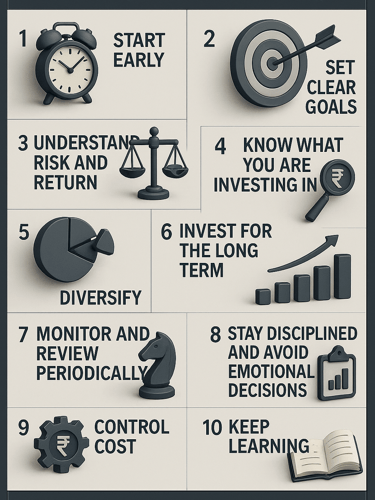Basic Principles of Investment


The basic principles of investment are foundational guidelines that help investors make informed, smart, and disciplined decisions to grow their wealth while managing risks. Here's a breakdown of the key principles:
1. Start Early - The earlier you start investing, the more time your money has to grow through the power of compounding.
2. Set Clear Goals - Know why you are investing - retirement, education, house purchase, etc. Goals will guide the investment amount, type, and duration.
3. Understand Risk and Return -Understand your risk tolerance and invest accordingly.
4. Know What You Are Investing In - Understand the product before investing. Blind investing or relying purely on tips can be risky.
5. Diversify - Proper assets allocation
6. Invest for the Long Term - Long-term investments tend to perform better and reduce the impact of short-term market volatility.
7. Monitor and Review Periodically - Review your portfolio regularly to make sure it aligns with your goals. Make adjustments if your life situation or goals change.
8. Stay Disciplined and Avoid Emotional Decisions - Avoid panic selling or greedy buying. Stick to your plan.
9. Control Costs - Watch for fees, commissions, and taxes — they can eat into returns over time.
10. Keep Learning - Investment is a continuous learning process.
Temperament and Habits Are More Important Than Technical Knowledge to Become a Successful Investor
When people think of successful investing, they often imagine mastering financial models, studying balance sheets, or predicting market trends. While technical knowledge has its place, the reality is different: temperament and habits play a far greater role in long-term investment success than raw knowledge ever can.
Warren Buffett, one of the most respected investors of all time, has said:
"The most important quality for an investor is temperament, not intellect."
This statement holds timeless wisdom. Markets will always fluctuate, but how you react to those fluctuations determines your results.
1. Why Temperament Outweighs Knowledge
The stock market is a constant test of emotional resilience. Prices rise and fall for reasons that are not always logical, and investors who lack emotional discipline often fall victim to fear or greed.
Key traits of a successful investor’s temperament include:


Patience: Staying invested during market volatility rather than panicking.
Discipline: Following a clear investment strategy without being distracted by short-term trends.
Emotional control: Avoiding rash decisions based on market noise or sensational headlines.
Even with deep technical expertise, an investor who panics during downturns may sell at a loss, while a calmer investor with less knowledge but stronger temperament stays invested and eventually benefits.
2. The Power of Habits in Wealth Creation
Knowledge tells you what to do, but habits ensure you actually do it. Good financial habits create structure and consistency, which compound over time into significant wealth.
Successful investors cultivate habits such as:
Regular investing: Using tools like SIPs to build wealth steadily over time.
Research before investing: Avoiding speculation and making informed choices.
Periodic reviews (not constant monitoring): Keeping an eye on your portfolio without overreacting to every market move.
Reinvesting profits: Allowing compounding to work its magic.
These habits, once developed, turn investing into a disciplined process instead of an emotional reaction to market events.
3. Why Knowledge Alone Is Not Enough
The market is full of highly educated investors who still fail to achieve their financial goals. Why? Because during a market crash, it isn’t knowledge but temperament that keeps you from panic-selling. Similarly, during a bull market, it’s discipline that prevents you from chasing overpriced stocks.
In other words, knowledge informs decisions, but temperament and habits execute them. Without execution, knowledge is simply potential, not power.
4. How to Build Temperament and Good Habits
The good news is that temperament and habits can be cultivated:
Think long-term: Ignore short-term market fluctuations and focus on your financial goals.
Automate investments: Set up SIPs and standing instructions to eliminate emotional decision-making.
Learn to wait: Train yourself to value patience and avoid impulsive trades.
Practice financial mindfulness: Review your investments periodically without over analysing daily movements.
Conclusion
In investing, intelligence helps, but temperament and habits determine whether you can stay the course. You don’t need to be a financial expert to build wealth—you need a calm mind, consistent discipline, and time.
Knowledge may open the door to investing, but it’s your temperament and habits that will carry you across the finish line.
Social media platform:
Your guide to financial freedom and wealth creation.
Contact us:
mfcompounding@gmail.com
+91 8800828426
© 2025. All rights reserved with MF Compounding.
Statutory disclaimer: This website is operated by Mrs. Pragati Chaturvedi, an AMFI-registered Mutual Fund Distributor (ARN: 332270). All content is for educational and informational purposes only and does not constitute investment, tax, or legal advice. Mutual Fund investments are subject to market risks and past performance is not indicative of future returns. Investors should read all scheme-related documents carefully and consult their own advisors before investing. While efforts are made to ensure accuracy, no liability is accepted for any loss arising from the use of information on this site.
